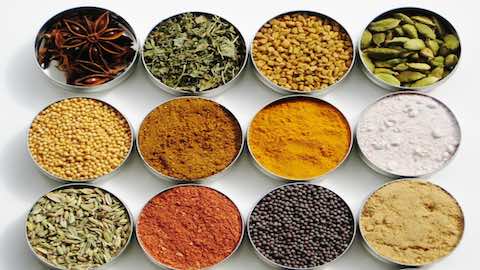- MENU
- HOME
- SEARCH
- WORLD
- MAIN
- AFRICA
- ASIA
- BALKANS
- EUROPE
- LATIN AMERICA
- MIDDLE EAST
- United Kingdom
- United States
- Argentina
- Australia
- Austria
- Benelux
- Brazil
- Canada
- China
- France
- Germany
- Greece
- Hungary
- India
- Indonesia
- Ireland
- Israel
- Italy
- Japan
- Korea
- Mexico
- New Zealand
- Pakistan
- Philippines
- Poland
- Russia
- South Africa
- Spain
- Taiwan
- Turkey
- USA
- BUSINESS
- WEALTH
- STOCKS
- TECH
- HEALTH
- LIFESTYLE
- ENTERTAINMENT
- SPORTS
- RSS
- iHaveNet.com: Healthy Spices and Herbs

Bold and Beautiful Spices for Health
By Sharon Palmer, R.D.
Bold and beautiful spices, one of today's hottest culinary trends, may offer more than just good taste. Scientists are now fascinated with the health potential of a variety of culinary herbs and spices.
A culinary herb is the leaf of a plant used in cooking; any other part of the plant, such as the buds, bark, roots, berries, seeds, and the flower stigma, is called a spice. Once treasured by early civilizations as natural preservatives and plant medicines, these flavorful seasonings continue to have many beneficial properties.
Hot Antioxidants
You probably already know that fruits and vegetables are high in antioxidants, but did you know that herbs and spices are very concentrated sources of these health-protective plant compounds? Antioxidants attract free radicals and destroy them before they can do damage to body cells; studies link diets high in plant antioxidants (found in foods, not supplements) with longevity and heart health.
Science demonstrates that within your daily diet, these zesty flavorings can significantly contribute to your total intake of health-protective antioxidants for the day. Researchers published their analysis of more than 3,100 different foods in the January 2010 issue of
Anti-Inflammation Action
Herbs and spices are not just about antioxidants; they contain other healthful properties. "Although herbs and spices have antioxidants that can be beneficial, I don't think the health benefits are just because of antioxidants; hundreds of plant foods have high antioxidant activity that don't act like spices. Spices occupy a special niche because they are anti-inflammatory.
"Most chronic diseases have been found to be a result of too much inflammation, including cancer, heart attacks, diabetes and Alzheimer's disease," says Bharat B. Aggarwal, Ph.D., Professor of
Mixing It Up
In many cultures, spices are enjoyed in a melange--take a delicious curry dish, for example, which may include up to 29 spices, including turmeric, garlic, ginger, and pepper--all in one fragrant pot. Scientists have observed that the benefits gained from these spice combinations may be greater than the sum of their individual effects--a phenomenon called synergy.
"Spices are synergistic; one is not enough. For example, it is very well known if you mix black pepper with curcumin, there are synergistic effects," says Aggarwal. For example, a 2009 study published in
A study published in the
Spicing It Up
What are you waiting for? Break open your spice cabinet and start spicing up your diet for health.
"The name of the game is variety. People should eat spices as part of the diet. In the old days, people used spices to preserve food and for taste. Spices are antibacterial, antiviral and antifungal. And now we know that they are anti-inflammatory," says Aggarwal.
"Spices add a different dimension to food. Don't be afraid of them. Be more willing to experiment with them. The beauty of all of these spices is that there are no side effects." Best of all? Herbs and spices taste a lot better than medicine.
Article: Copyright © Mayo Clinic
Health: "Bold and Beautiful Spices for Health"